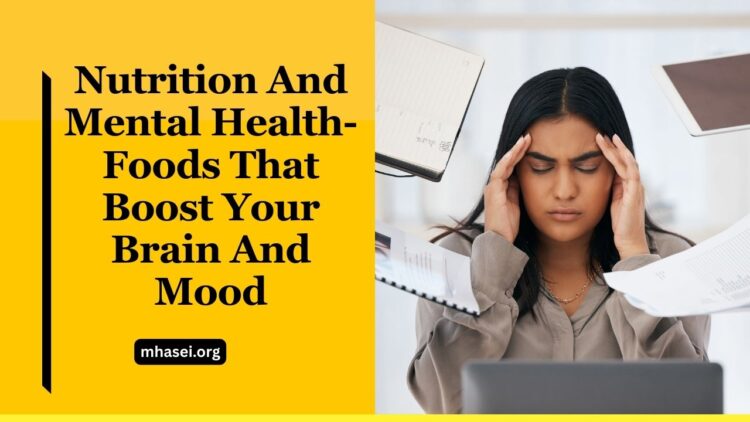The food you eat doesn’t just fuel your body—it has a direct impact on your mental health and emotional well-being. Research shows that certain nutrients can help stabilize mood, improve memory, and reduce the risk of conditions like anxiety, depression, and cognitive decline.
While many people focus on diet for weight loss or physical health, the connection between nutrition and mental health is just as important. In this article, we’ll explore the best foods that boost brain function and mood, how they work, and practical ways to add them to your daily routine.
Foods That Improve Mental Health
| Food Category | Key Nutrients | Brain & Mood Benefits |
|---|---|---|
| Fatty Fish (salmon, tuna, sardines) | Omega-3 (EPA, DHA) | Improves memory, reduces depression, supports focus |
| Nuts & Seeds (walnuts, almonds, chia) | Magnesium, Vitamin E, healthy fats | Reduces stress, sharpens memory, protects brain cells |
| Leafy Greens (spinach, kale, broccoli) | Folate, Vitamin K, B-vitamins | Supports neurotransmitters, slows cognitive decline |
| Whole Grains (brown rice, oats, quinoa) | Complex carbs, fibre, B-vitamins | Stabilizes blood sugar, improves serotonin levels |
| Fermented Foods (yogurt, kefir, kimchi) | Probiotics | Improves gut-brain health, boosts serotonin |
| Berries (blueberries, strawberries) | Antioxidants, Vitamin C | Fights inflammation, protects brain from aging |
| Dark Chocolate (70%+) | Flavonoids, magnesium | Boosts mood, increases blood flow to the brain |
Omega-3 Rich Foods- Essential for Brain Function
Omega-3 fatty acids are among the most powerful nutrients for mental health. Found in fatty fish like salmon, sardines, and mackerel, omega-3s help improve neural communication, reduce brain inflammation, and may lower risks of depression.
For those who don’t eat fish, walnuts, flaxseeds, and chia seeds are excellent plant-based alternatives.
Nuts and Seeds- Nature’s Stress Fighters
Nuts such as almonds, cashews, and walnuts are packed with magnesium, which helps regulate stress and anxiety. Vitamin E in nuts protects brain cells from damage, while healthy fats improve focus and memory.
Seeds like pumpkin seeds and sunflower seeds are rich in zinc and magnesium, both linked to better mood regulation.
Leafy Greens- Fuel for Cognitive Health
Dark green vegetables like spinach, kale, and broccoli are loaded with folate, vitamin K, and B-vitamins. These nutrients support the production of neurotransmitters like serotonin and dopamine, which regulate mood.
Eating leafy greens regularly has also been linked to slower cognitive decline and improved concentration.
Whole Grains- Steady Energy, Steady Mood
Whole grains such as brown rice, oats, and quinoa provide complex carbohydrates, which release energy slowly and prevent mood swings. They also help boost serotonin production, the hormone responsible for feelings of happiness and calm.
Replacing refined carbs with whole grains is a simple but powerful step toward better mental health.
Fermented Foods- The Gut–Brain Connection
Your gut is often called the “second brain” because of its strong connection to mental health. Fermented foods like yogurt, kefir, sauerkraut, and kimchi contain probiotics that support healthy gut bacteria.
A balanced gut microbiome improves serotonin production, helping reduce stress, anxiety, and depression symptoms.
Berries- Antioxidant Power for the Mind
Berries are rich in antioxidants that fight oxidative stress and inflammation in the brain. Blueberries, strawberries, and blackberries are known to improve memory, learning, and focus.
Adding a handful of berries to your breakfast or snacks can provide a natural mood boost.
Dark Chocolate- A Sweet Mood Enhancer
Good news for chocolate lovers—dark chocolate (70% or higher cocoa content) is packed with flavonoids that increase blood flow to the brain, enhancing focus and memory. It also stimulates the release of endorphins and serotonin, improving mood.
Enjoy small portions daily for the best effect without excess sugar.
Balanced Diet Patterns- The Big Picture
Instead of focusing only on single foods, dietary patterns like the Mediterranean Diet and MIND Diet emphasize a balance of:
- Vegetables and fruits
- Whole grains
- Lean proteins
- Healthy fats (like olive oil and nuts)
- Minimal processed foods
These diets are consistently linked to better brain health, lower depression rates, and reduced risk of Alzheimer’s disease.
Practical Tips to Add Brain-Boosting Foods
- Start your day with oatmeal topped with berries and nuts.
- Replace fried snacks with a handful of almonds or pumpkin seeds.
- Add a serving of leafy greens to at least one meal daily.
- Enjoy yogurt with fruit as a probiotic-rich snack.
- Treat yourself to a square of dark chocolate instead of sugary desserts.
Your diet is one of the most powerful tools for supporting mental health and brain performance. By eating more omega-3 rich foods, leafy greens, nuts, whole grains, fermented foods, berries, and dark chocolate, you can improve mood stability, boost memory, and protect your brain against aging.
The takeaway? Every bite matters. Choosing nutrient-rich foods helps you feel calmer, sharper, and happier—laying the foundation for long-term emotional resilience and cognitive strength.
FAQs
Can food really affect mental health?
Yes, certain foods directly impact neurotransmitters like serotonin and dopamine, which regulate mood, focus, and stress levels.
Which food is best for quick mood improvement?
Dark chocolate and berries can provide an immediate boost, thanks to antioxidants and mood-enhancing compounds.
Do I need supplements if I eat brain-boosting foods?
Not always. A balanced diet rich in whole foods often provides enough nutrients. Supplements may be useful if you have deficiencies.




